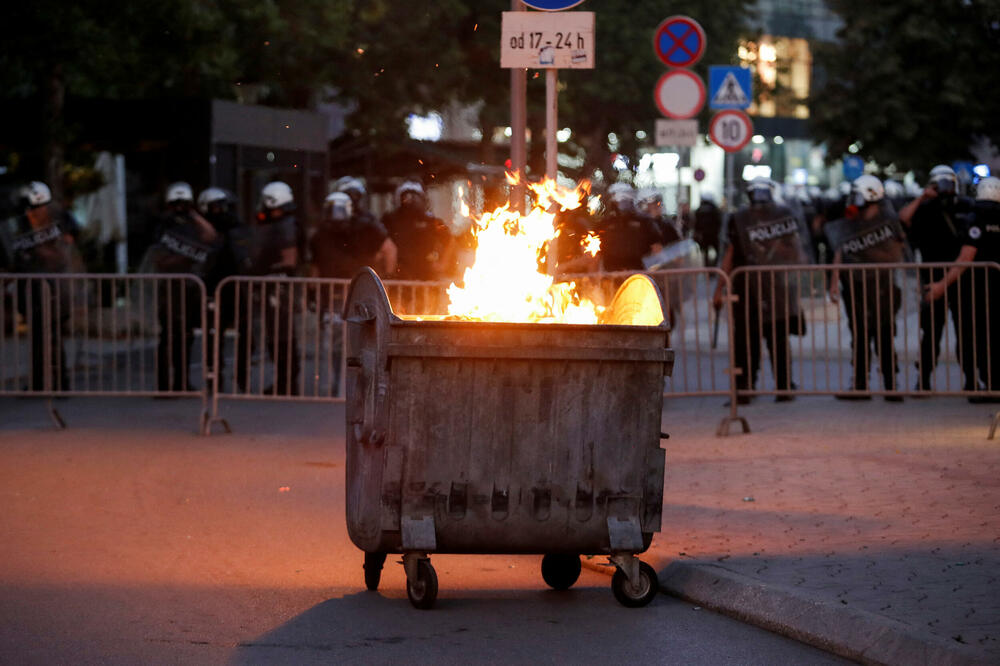There was something intriguing and disturbing about that scene. Quite provocative. The top of the state, honorable members of parliament and elected officials at the opening of the highway, smiling, optimistic, staring at the future that the highway certainly makes closer... Actually, when you look closely, they also look like "provocateurs". Only their "provocation" is disguised in different forms, but when you reduce things to the end and to the right measure - everything is a provocateur.
At the same time, on the other side of the country - street riots, followed by dilettante behavior of the police. Dull and primitive "Orthodox" fundamentalists and executed and unconvincing "patriotic" celebrants. By the way, when I heard them singing to the police Why did you hunt us down, you Chetniks… I remembered the day that song was written. That's what the Montenegrin liberals, rightly and truly, sang in 1992. Đukanovićeva to the police... (Be sure that the team from 1992 would have dispersed these "conspirators" in five minutes. But that's another layer of the story.)
That kind of counterpoint is possible in banana states - where the elite live one reality and the street lives another. The clash of these realities decides the fate of society. One of the possible outcomes of such tension is u Godfather II, when in the course of a lively New Year's celebration with American rich people, he falls Batistin the regime and the dictator flee by plane. And it is not the only scene with a similar narrative: in some countries, it seems that one should be careful with the celebration.
Speaking about the perpetrators of the Nikšić riots, the Minister of Police says that they are "provocateurs". Let's be more precise - the videos show wild fascists ready for any abomination. If they are "provocateurs", find out who sent them and why. If you do that, you will help Montenegro more than you can imagine.
Do the smiling people from the opening of the highway realize what they are playing with when they enter such scenarios. And what is the meaning of such "provocation". Or are the politicians in their labyrinths of provocation and fraud and have forgotten what and why they are doing?
Maybe they, as politicians, are similar to this highway. Because this is just a sample, which cost a little less than the entire car trip was predicted to cost. Local politicians (and those as expensive as the highway) often act as politicians in "sections", far from some form of whole. After a couple of decades in local politics, the man looks as if he has been pulled "by the tails of a horse". They are like those football teams who can't last more than fifteen minutes of good play, but wonder why they keep losing. That's why this highway is their ideal image. A true emblem.
It would be interesting to create a registry of politicians' expectations regarding the opening of the highway. Many rushed to open it, and saw themselves in that role, but the prime minister of the minority government fell. Maybe some will find elements of the Albanian-Serbian conspiracy in that too?
The energy generated by the debate over the fundamental contract has brought the so-called issue back into the spotlight. religious education, that is, the presence of religious communities in the education system.
The church has in many cases and in many places preserved some knowledge, but such a combination of circumstances does not change the basic insight: when the church managed education in the community, the majority of people were illiterate and fundamentally unknown, and as such ideal servants of power, whether political or ecclesiastical. (As if that's not the same.)
That's why it's always a little surprising to see this topic publicly promoted in this post-age. We no longer have the right to naivety, whatever the accompanying story may be. Just as you don't leave your property in the safekeeping of a secikesi, with the same functional logic, you keep education as far away from the church as possible.
Does the current government, despite the euphoria surrounding the Basic Agreement, have a way to control pseudo-religious fanatics, either on the street or in the political or educational system? This is the key issue of Montenegrin society today.
Bonus video:





